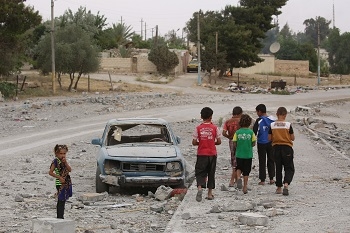Over 180,000 people need urgent humanitarian aid in southwestern Syria, says UN

According to Jens Laerke, spokesperson for the Office for the Coordination of Humanitarian Affairs (OCHA), there are particular concerns for 55,000 civilians who have been restricted by the extremist group Jaysh Khaled Bin Walid (JKBW).
He added:
“We are, of course, very concerned about this particular group’s policy of restricting freedom of movement for civilians who are trying to flee the area and only a very limited number of civilians had been able to escape.”
OCHA said in a statement that the terrorist-controlled area associated with ISIL span approximately 200-square kilometres of Syrian territory near the Jordanian border.
Thousands of people are trying to seek security from JKBW, but those who have stayed are experiencing increasing hostilities.
OCHA said in a statement that targets include al-Shajra, Hayt, Tasil, Jellin, Sahm al-Golan, Adwan and Tal al-Jumou.
According to the report, at least 32 civilians were killed in these attacks, including 11 children and 3 women.
ISIL’s suicide attacks in Sweida City killed more than 240 people and injured at least 170 people on Wednesday, July 25.
UN Secretary-General Antonio Guterres strongly condemned the incident, which cam alongside calls from UN Security Council from UN Special Envoy Staffan de Mistura to end the seven year Syrian war.
According to OCHA, in the south-west of Syria near the Golan Heights, another area remains under the control of the opposition. There, civilians face continuous violence and cross-border humanitarian supplies are dwindling.
Jens Laerke commented:
“Our humanitarian partners who have operated across borders from Jordan are highly restricted. In fact, it’s over a month since there has been a cross-border convoy from Jordan into the area.”
According to OCHA, the last cross-border convoy of neighbouring Jordan was dispatched on 25 June.
OCHA stated that the delivery of humanitarian assistance from Syria continues to be hampered because aid partners have not been granted approval and are unable to travel to Quneitra.
These restrictions mean that unmet needs are increasingly sharply, the situation has been exacerbated by the fact that many local aid partners have also been forced to flee the fighting, resulting in a significant reduction in aid.
Jens Laerke concluded:
“More warehouses are now empty or emptying, which mean that we are very concerned about the continued delivery of lifesaving assistance to those many thousands of affected people.”
Join us for the 10th Anniversary AIDF Global Summit in Washington D.C, USA on 5-6 September 2018 to discuss to discuss disaster relief.
If you’d like to stay informed on the latest updates in aid and development, please sign up for the AIDF newsletter.
Image credit: UNICEF












